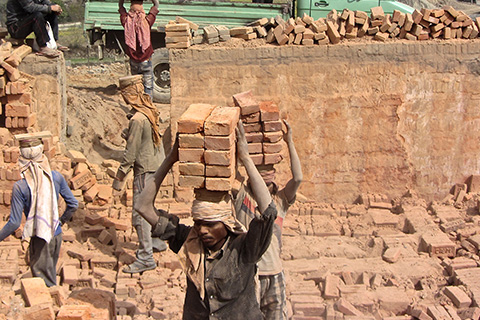
Today, there are nearly 300,000 people, including 60,000 child laborers, who are working on brick kilns in Nepal. Like most of South Asia’s brick industry, severe exploitation marked by harsh living and working conditions and unfair contractual obligations has been a defining feature of Nepal’s 1,300 registered brick kilns, which mostly employs seasonal migrant workers from indigenous and low caste communities.
Despite the prevalence of child and forced labor in Nepal’s brick industry, there are several kilns taking the needed steps to improve working conditions and ensure that their kilns remain child and forced labor free. These kilns, in partnership with the Better Brick – Nepal initiative, are leading change in their industry and demonstrating that it is possible to be a socially responsible and profitable kiln in Nepal.
Of these leaders, two kilns have just been certified as free of all forms of child, bonded, and forced labor. An additional 20 kilns have also been verified as child labor free.
Launched by Humanity United in 2013, in collaboration with Global Fairness Initiative (GFI), GoodWeave International, and a coalition of local Nepali NGOs, the Better Brick – Nepal initiative has been working to transform Nepal’s brick industry by eliminating child, forced, and bonded labor. The program has worked to create a market-based approach that incentivizes kiln owners to change their traditional business practices—which rely heavily on exploitation and systems of coercion—towards business models with zero tolerance for debt bondage and child labor.
Starting with only five pilot kilns, Better Brick – Nepal has since grown to include 40 kilns supporting over 8,000 workers per year. From these 40 partner kilns, approximately 220 million bricks are being produced each year on child labor free kilns, representing over 3% of Nepal’s total brick supply. The domestic market is responding accordingly with over 120 commitments secured from local buyers, builders, construction firms, and local government authorities to purchase Better Bricks for the use in the construction of schools, religious centers, and government buildings throughout the country.
These developments are only the beginning, but they represent an important change in the attitudes and practices of Nepal’s brick industry. The certification of two kilns as being free of exploitive labor, as well as the increasing number of kilns in the Better Brick Nepal program are major signs of progress and we are excited for its potential.